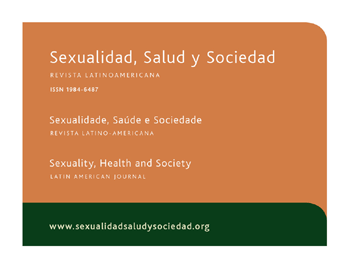The 26th issue of Sexualidade, Saúde e Sociedade - Revista Latino-Americana has a special meaning for its editorial team. The State University of Rio de Janeiro (UERJ), home of the journal’s publisher - the Latin American Center on Sexuality and Human Rights (CLAM) - is undergoing an unprecedented historical moment. Since last year, UERJ is being strongly affected by the Brazilian current economic and political crisis which dramatically touches the state of Rio de Janeiro. In the last months, the university has seen its funding decrease to almost nothing. Its employees, from technicians to professors, are not having their wages paid regularly; students are not receiving their fellowships; and dramatic cuts have been made on the funding of research and extension projects. Nonetheless, we have been able to maintain the journal’s activities. Hence, this issue is a proof of the energy which upholds the resistance movement for a free and public university in Brazil
This issue is also significant for those concerned with the increasing conflict over sexual and reproductive rights in Latin America, and with the strengthening of conservative discourses all over the region. In a close debate with the six articles that compose the dossier “Fundamentalisms”, organized by invited editors, the remaining articles discuss this conflictive political context from different perspectives. They share the challenging task of questioning simplistic binarisms, such as those opposing science and religion, rights and oppression, protection and violence, cure and repression.
The limits of a more comprehensive assertion of women’s human rights is significantly present in this issue, through discussions on crucial topics such as prostitution, domestic violence, and abortion. On the former, Martha Cecilia Ruiz analyses the relatively unexplored phenomena of sex workers’ migration between countries located in the so-called Global South (Ecuador-Peru-Colombia). Reviewing critical literature regarding other national contexts and migration flows, the author shows how, despite the actual interest of the supposed “victims”, the human rights discourse against the traffic of women for sexual exploitation became a means to reinforce border control and to strengthen national identities. Estefania López Ramirez and Gladys Rocío Ariza Souza, both from the Universidad de Antioquia (Colombia), approach the theme of domestic violence by conducting a detailed literature review on the category of “overcoming”. Regarding abortion, this issue presents the results of two original researches exploring the relations between religion, morality, science and rights. María Eugenia Monte examines a recent Argentine Supreme Court decision related to legal abortion procedures in cases of sexual violence. According to the author, after this Court decision, in order to authorize an abortion judges should first resort to science, to a “qualified” medical team that should establish the “veracity” of the reported abuse. The voices of women victim of sexual violence are thus silenced. The activism of pro-life groups had an important role in this decision. And their intense mobilization in Argentina is precisely the focus of Pablo Gudiño Bessone’s provocative ethnography. His paper shows the aggiornamento of anti-abortion Catholic positions, now sustained by scientific discourses and bioethical understandings.
The complex intertwining of science, religion, and politics is also studied by Ana Tereza Acatauassú Venancio and Pilar Belmonte. They draw attention to legislative debates which took place in 2003 in the Rio de Janeiro state parliament, regarding a law bill that would allow public funding of organizations promoting the “cure” of homosexuals, in other words, their transformation into heterosexuals. The ultimately rejected bill was supported by Christian psychologists who struggle against the Brazilian Federal Psychology Council’s 1999 resolution which considers such “treatments” as anti-ethical and unscientific.
Two historical works analyze early 20th century Argentine medical discourses. José Ignacio Allevi discusses the normative dimensions of medicine. Its alignment to moral precepts and religious principles is evident in the cases of “sexual inversion” as observed in the Penitenciaría Nacional de Buenos Aires by the forensic doctor Francisco de Veyga. Conversely, as Nadia Ledesma Prietto arguments, it was in the medical discipline that dissident voices regarding sexual morals also emerged. Such was the case of Juan Lazarte and Manuel Martín Fernández, physicians with anarchist political affiliations, who defended sexual pleasure (no doubt heterosexual) independent from reproduction, women’s sexual autonomy, and legal divorce. In a way, echoes of all these voices, either liberal or conservative, are still resonant in the positions polarizing contemporary sexual politics.
Taken together, the articles of this issue and the accompanying dossier help outline a complex contemporary scene. In the (bio)political field where the current disputes over sexuality take place, multiple discourses are entwined - scientific, moral, religious, ethical - each of them suffering pressure from inside by divergent positions, often antagonistic. The possible horizons on sexual and reproductive rights depend on the configurations assumed by the pressure exerted by each of these discourses and their internal divergences. For now, no movement forward seems to be completely assured; no movement backwards seems impossible.
Publication Dates
-
Publication in this collection
Aug 2017

